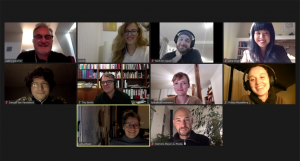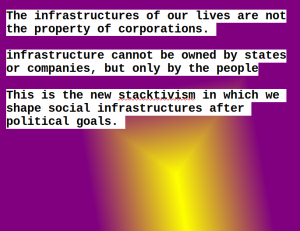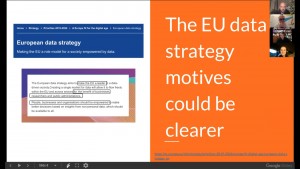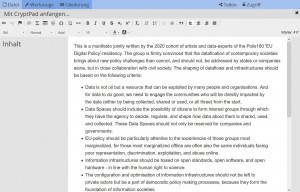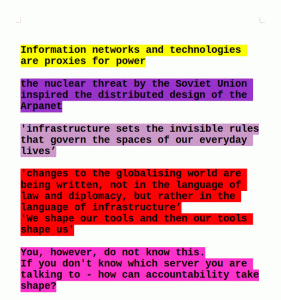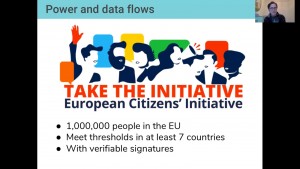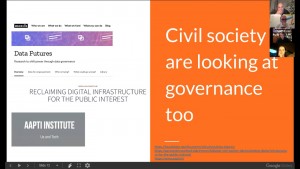
During the WirVsVirus Hackathon, Germany presented a first impressive example of how to involve the general population in finding solutions to societal challenges. Particularly in the process of digitization, we need more exchange and participation throughout society and a culture of cooperation such as the Data Collectives in Taiwan, for example, could offer an alternative for the EU to current surveillance capitalism and our future handling of data.
Our online residency on data collaboratives aims to connect thought leaders in data analytics and creative minds to strengthen social self-determination in the process of digitization. By involving various perspectives in the reflection on data-driven solutions and technical products, we shed light on EU data strategies and the hot topics in the field from different angles and design alternative, more inclusive visions for the future.
Our online residency features four tandems of data experts and artists from all over the EU. They work together on a question concerning the handling of data in the EU. The tandems are free to choose the following or other perspectives:
- Analysis of the Status Quo
- Concrete perspectives for action
- Key challenges
- Visions for the future (concrete solutions or forms of collaboration etc.)
- Forms of mediation to sensitize the general population to the topic
Over a period of three weeks, our tandems exchange thoughts and ideas publicly on a dedicated public slack channel.
Clemens x Valéry

Clemens Meyer zu Rheda converted to Data Science from physics and is now building data products and infrastructure to find and evaluate startups. Valéry Grancher is an artist: His latest work was shown in Fosun Fundation Shanghaï, CADAF 2020 art fair, Digital Art Month New York, and MOW Museum, Changsha, Hunan, China. His productions are included in several public collections such like Cartier Foundation for contemporary arts (Paris).
Together they are working on “The epidemic nature of information data and how it’s endangering European democracies”.
Larisa x Niels

Larisa Blazic is a London based digital artisan, educator and feminist hacker with practice ranging from net.art to Free/Libre/Open Source Software (FLOSS) art and design. One of her latest projects, Data Union Fork, supported by S+T+ARTS, was presented inter alia at the Centre Pompidou. Niels ten Oever is a postdoctoral researcher with the ‘Making the hidden visible: Co-designing for public values in standards-making and governance’-project at the Media Studies department at the University of Amsterdam.
Together they are working on approaches to transfer power from corporate information architectures to social infrastructures.
Violeta x Lena

Violeta Mezeklieva is a data scientist and is working at the Open Data Institute in London as a Data Literacy Specialist. As such, she is committed to making data become the asset everyone can use to succeed. Lena Chen is a Chinese American artist, activist, and sex worker working across performance and social practice. Named „Best Emerging Talent“ at the B3 Biennial of the Moving Image, she has performed and exhibited at Transmediale (Berlin), among others.
Together they are working on the creation of a data co-operative for sex workers.
Gunay x Samuel

Gunay Kazimzade is a Doctoral Researcher on Artificial Intelligence at the Weizenbaum Institute in Berlin and in Computer Science at the Technical University of Berlin. Her main research directions are Gender and racial bias in AI, inclusiveness in AI and AI-enhanced education. Samuel Van Ransbeeck is a trained composer with a PhD in electronic music and interactive arts. He developed DataScapR, a sonification toolbox for composers and sound artists and used this system to sonify police violence for the Outros Registros project, among others.
Together they are working on a soundwork, addressing fakeness in the computer voices and opposing artificial with real human voices.
Join the discussion
Data economy and policies in this context affect us all – that is why our online residency aims to include the public into discussion. Join our public slack channel for insights and exchange – both with the participants of the online residency and renowned impulse speakers.
On December 10, 2020 our tandems will present their whitepapers and elaborate their processes. This online meeting is open to the public and we are happy to invite you to participate and discuss the opportunities and challenges of the data economy and the EU strategy for data.
Our collaborative process
Our Manifesto
Our residency worked on a joint Manifesto that summarizes our thoughts and demands regarding the EU data strategy. Take a look and share your comments!
Project lead

Isabelle Kranabetter
Isabelle is a curator and dramaturg/director (at Festival d’Aix-en-Provence, Biennale di Venezia and others) who facilitates collaborations at the intersection of science, technology and art in newly developed formats in order to create sustainable and societally oriented innovations.
At Polis180 she initiates and realizes projects in the programs Digital Policy and Cultural Policy.

Nicole Stein
Nicole is an entrepreneur and researcher at Wuppertal Institute for Climate, Environment and Energy and research associate at IE Applied Lab – Tel Aviv University. Her work focuses on the interplay of sustainability and digitization – especially on new business models and AI-supported activities. She is part of the Digital Transformation and Cyber Security programme at Polis180.
This project is funded by the German Federal Foreign Office

